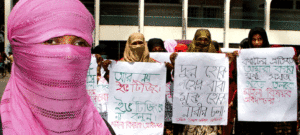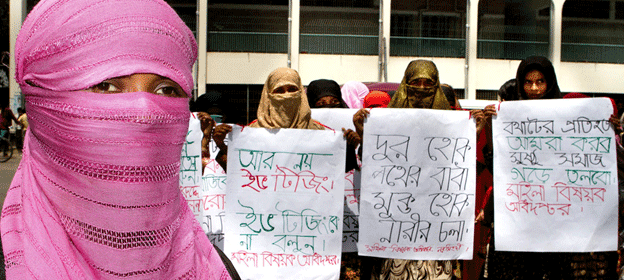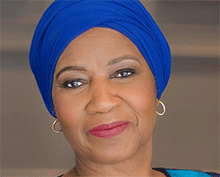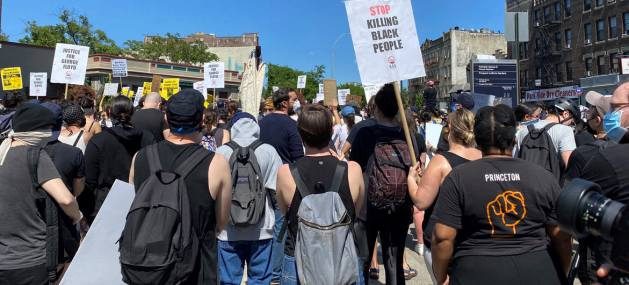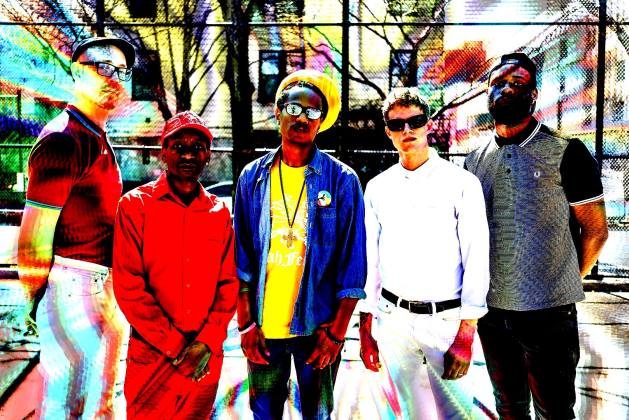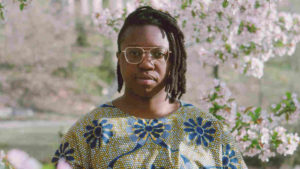
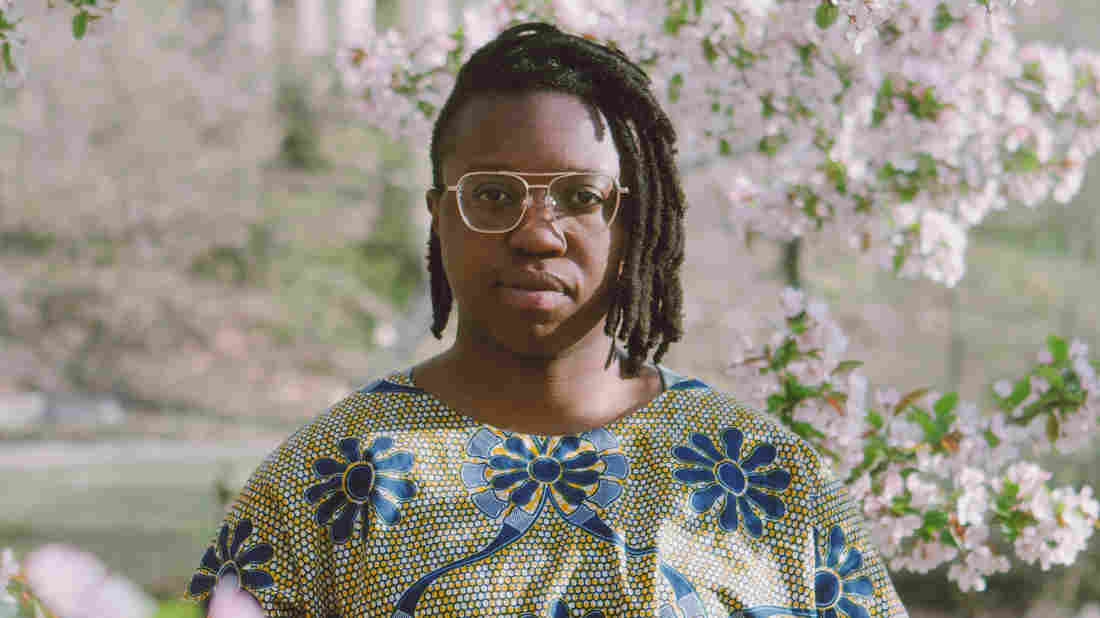
Anjimile’s debut album, Giver Taker, is out Sept. 18. Courtesy of the artist hide caption
toggle caption
Courtesy of the artist

Anjimile’s debut album, Giver Taker, is out Sept. 18.
Courtesy of the artist
“My partner tells me that apparently I only sing when I’m happy,” says Anjimile Chithambo, who performs and records music mononymously as Anjimile. It’s a slightly surprising admission. For one thing, the singer-songwriter’s new album, Giver Taker, is full of piercing self-knowledge; it seems like they don’t need anyone to explain their musical process to them. For another, the album is the product of some extremely trying situations: Anjimile wrote many of the songs while in treatment for alcoholism and while coming to terms with their identity as a trans and nonbinary person. Still, it’s a warm, beautiful album, full of moments of wonder and joy at having emerged on the other side of hardship.
Giver Taker, out Sept. 18, is being billed as their debut album, though Anjimile’s previous self-produced releases have steadily earned them attention in Boston, where they’re based. Their Tiny Desk Contest entry from 2018 earned them the title of WBUR’s favorite Massachusetts entry, and GBH named them a Slingshot Artist to Watch in 2019. Thanks in part to a grant from Live Arts Boston, Anjimile hired producers for the first time to record Giver Taker: their bandmate, Justine Bowe, and multi-instrumentalist Gabe Goodman. Anjimile says the trio brought a range of influences — from Bob Dylan to Kate Bush, from Radiohead to India.Arie — into the studio, which refract across the album’s nine tracks of introspective indie-folk. On songs like “1978” and “Not Another Word,” Anjimile’s fingerpicked guitar and choir-trained voice are reminiscent of Sufjan Stevens, filtered through the ’80s divas they grew up on; on “Ndimakukonda,” they sing in Chichewa, the language spoken in Malawi where their family is from.
Ahead of Giver Taker‘s release, Anjimile spoke to NPR Music about the process of healing that led to these songs, their deep love for The Lion King and their feelings about releasing their debut album in a time of great social upheaval.
This interview has been edited for length and clarity.
[embedded content]
YouTube
Marissa Lorusso, NPR Music: There’s a real range of sounds across Giver Taker. What did you listen to growing up?
Anjimile: Growing up, I listened to what my parents listened to — and the older I get, the more I’ve been able to recognize how awesome their taste in music is. So there was always a lot of Bob Marley, Madonna, Michael Jackson, Tina Turner, Whitney Houston. And there are also super into Celine Dion and Dolly Parton.
A lot of iconic singers.
Yeah. I was introduced at a very young age to some very epic and iconic singing.
You grew up singing in choirs, right?
Yes. I have two older sisters and they both grew up singing in the school choir. I would go with my family to see the performances, and I just thought it was the coolest thing ever to see middle school choir concerts; I was enamored. [Laughs.] So as soon as I was old enough — fifth grade — I joined the Plano Children’s Chorale and and it was on.
Did singing in choirs have an impact on the way that you write and sing your own music?
Definitely. I had a very imperious choir teacher in high school — he was all about long vowels and super-obsessed with tonality. We would do warm-ups, and we would be singing our pieces, and if you were sharp or flat, he would look you dead in the eye while conducting the chorus — it was very frightening and also super helpful. I didn’t I didn’t realize how much I learned from him until I started recording this album; I practiced the warm-ups I learned in school and I am very acutely aware of tonality.
I ask, too, because faith is something that comes up across your music — and you’ve said your song “Maker” is about the relationship between your gender identity and your spirituality. What do you mean by that?
As I’ve come to recognize that I am trans and non-binary, this realization has coincided with a deepening of my spiritual life. I have a deep-seated belief that if I do the next right thing, I’m going to be alright — and part of doing the next right thing, for me, was recognizing that I was trans and that I needed to come out to myself and to my loved ones and to my parents.
When I was growing up in Texas and I came out to my parents, it was not a positive reception. They were devastated; my sexuality — at the time I identified as a lesbian — felt like it was in direct conflict with their conservative Christian beliefs. That’s something that I held on to for a long time. When I wrote “Maker,” it was the beginning of the realization that just as I could build my own sense of spirituality and build my own faith and relate to a God of my understanding, I could do the same thing with my gender and my sexuality. And that’s what I did.
I know you were also dealing with some other mental health challenges when you were writing the album; you’ve said many of the songs were written when you were “literally in the process of improving [your] mental health.” What did that process look like for you?
For me, that was rehab. I’m a recovering alcoholic and my addiction reached a peak, or, I guess, a low point, at the end of 2015, and I went to rehab and at the beginning of 2016. I brought my guitar and I brought a plastic bag with some clothes and I went to Florida and I ended up staying there for a year; I think I brought my guitar because I reckoned I might be there for a while.
I was a mess, and I wrote a lot of this album in the process of becoming not a mess — or, I guess, in the process of healing. Up until that point, I kind of had just resigned myself to the fact that I was going to die an alcoholic — and so my subsequent sobriety and recovery feels like a huge plot twist to me, four and a half years later. And the more days I had sober, which turned into months, which turned into years, the more mental clarity I developed and the more emotional clarity I developed. And with that, my creative spark came back and I started writing and signing again.
This record was the first time that you worked with producers — all your previous recordings were made by you, and this feels like a real step forward in your production and songwriting. What was that like?
My bandmate Justine Bowe co-produced Giver Taker with Gabe Goodman, the principal producer. He’s an indie artist based in New York; he plays bass, he does arrangement stuff and programming and engineering. And Justine plays a variety of keys and does vocals and plays the clarinet, and also has an incredible ear for arrangements as well. It was inspiring for me to work with folks who were working at that level of musicianship.
Before working with them, I didn’t really know anything about what production means or what a producer does; I was just doing stuff DIY, but Giver Taker came with a budget because I got a grant from Live Arts Boston last year, so I was able to hire Justine and Gabe. I showed them demos of each song and they gave me their thoughts, like, “This one sounds good, maybe let’s take out that second chorus,” or “What if this had drums here? What if this had bass there?” They just presented so many ideas that I never would have thought of. … And every time they would suggest an idea, I would be like, “Please try it out,” and then we would listen to it and it would sound great.
[For example,] for the last song on the album, it’s called “To Meet Me There.” We had a hard time with it, figuring out where the peaks and valleys of the song should be, how it should rise and fall. There’s a bridge; in an older recording of the song, the bridge was a choral situation. Gabe had the idea to bring in like a conga sound to the bridge — and Justin was like, “Make it a filter sweep,” so it starts off muffled and then gets clearer and clearer. So this bridge went from being something that had a choral vibe to just like the funkiest, in my opinion, most interesting point in that song. It’s a folk tune, and then all of a sudden there’s this really smooth, sexy, African drumming. It was amazing.
The album cover for Giver Taker is a painting of you. Can you tell me a little bit about it? I feel like for artists who are marginalized in any way, the idea of representing yourself on your own terms can feel especially important or valuable.
Well, it’s a big old painting of my face. I’ve released DIY records in the past that have all been like some sort of portrait of me, and I started doing that basically I thought it was important to have to have a visual of a black queer person prominently featured.
You know, if it wasn’t for that, I wouldn’t do it — because the last thing I want to see is a picture of my own face. I know what my face looks like! I don’t need to see it. [Laughs.] But I think it’s an important statement about representation. And if another queer person, another queer black person, can be like, “Hey! That’s Anjimile on this album cover, like, that’s so sick,” then it’s totally worth it.
Did you do the painting?
It’s by Rebecca Larios. She is an incredible painter. My bandmate Justine Bowe took the photo that the painting is based on, and we wanted to incorporate — because I’m a hippie — some sort of greenery that relates to me. So there’s sugarcane in the back behind me; sugarcane is an indigenous crop to Malawi, where my family is from.
And then, behind that, there’s a river which is based upon The Lion King. There’s one scene in “I Just Can’t Wait To Be King,” which is one of my favorite songs of all time, where Zazu is standing on a log and he’s about to go down a waterfall. We sent Rebecca a bunch of stills from that and she literally painted me into the scene from The Lion King… I was really pumped.
Wait, tell me about your love for The Lion King!
It’s my favorite movie … When I was growing up, the first Disney movie with Black people that wasn’t, like, Uncle Remus was The Princess and the Frog. And that was years after I was a kid. And so, in my mind, as a kid, seeing The Lion King based in Africa, I was like, “Holy s***, my parents are from Africa, like, I’m in this movie!” [Laughs.] My parents were like, “Well, not exactly…” [Laughs.]
Just the fact that there was like an African language, Swahili, spoken in the songs and the fact that it was set in Africa, even though there were no people — it was a big deal for me as a young, African-American kid who had never seen representation like that in Disney. I just love everything about that movie; I love the singing, I love the animation, I love Mufasa and “I just can’t wait to be king” is more or less a mantra for my life.
When you think about everything that is going on in the world right now — the pandemic, the Black Lives Matter movement, the economic crisis, all of it — I imagine these aren’t exactly the circumstances that you were expecting to release your debut album into. How are you feeling?
I’m feeling like I just — all I can do is try to take good care of myself and show up for another day. Like, yeah, we have music coming out and there’s a pandemic, and there is also what appears to be an upsurge of Black death in the news. But I was thinking about it the other day and I realized that if I was to stop promoting stuff every time there is police violence or racist violence, I would never promote anything. Which is, you know, a pretty demoralizing thought. But, also, I don’t know what great circumstances are, so — it is what it is, and it’s a bright spot in my life right now. And my friends are a bright spot, and my family. Working with the record label is wonderful. And the fact that this album is coming out after so much work is a bright spot.
Is there anything else you think people should know about this record or about your music when they hear it?
So, I’ve got a tune on the record called “In Your Eyes.” And a lot of it has to do with the pain of me coming out to my parents and just how much it sucked. And I recently came out to my parents again as trans, and my dad was super supportive. He sent me the most kind, most loving email, and he was like, “I don’t want you to think that you can’t come home,” like, “I love you and accept you for who you are, and I believe that God created all folks, you know, even, especially trans folks, in his image. So feel free to come home any time.” And before that point, I hadn’t shared anything about the album with my parents. And now I get to show him everything. It’s really nice to be able to feel accepted within my family by someone who I really care about. I’m going to send him over some vinyl a little bit.



